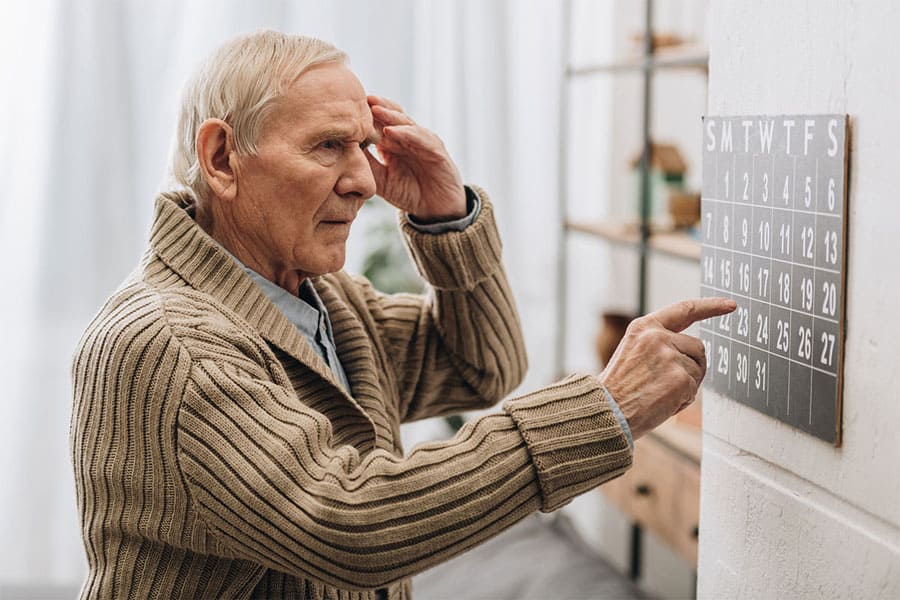
Dementia or Age-Related Forgetfulness. “Grandma keeps forgetting where she put her glasses lately – is this still normal?” Such thoughts worry many relatives when they notice changes in the behavior or memory of older family members.
Forgetfulness in old age is a common problem – but where does normality end and dementia begin? Uncertainty is high, as the transition can be gradual.
The purpose of this article is to clarify: what distinguishes age-related forgetfulness from the onset of dementia? What are the warning signs and when should you act? At the same time, we would like to encourage family members to watch closely, but not to immediately assume the worst.

What is normal age-related forgetfulness?
With age, mental performance declines somewhat – similar to physical endurance or vision. This is not an automatic sign of illness, but rather a natural process.
Examples of age-related forgetfulness:
- Sometimes you forget about appointments, but remember them later.
- As a story unfolds, you lose the thread of the story, but quickly find it again.
- You put things in unusual places (like milk in the cupboard).
Forgetfulness in old age often occurs with stress, fatigue, or new situations – the brain needs more time to process information. Such changes are normal as long as they do not significantly affect everyday life.
One important difference: people with age-related forgetfulness are often aware of their minor blunders and can laugh about them. With dementia, things are different.
What is dementia and when does it start?
Dementia is a general term for diseases in which mental abilities decline below normal levels, either permanently or gradually. The most common form is Alzheimer’s disease, followed by vascular dementia, dementia with Lewy bodies, and other rarer variants.
Typical signs of dementia:
- Repeating the same conversation without realizing it
- Difficulty using everyday devices
- Confusion of times, places, and people
- Mistrust, uncertainty, sometimes aggressiveness
- Changes in personality or mood
How to recognize dementia in the early stages? It often starts with seemingly harmless things, but unlike normal age-related forgetfulness, the problems increase rather than decrease.

How to Recognize Dementia in the Early Stages?
How to Recognize Dementia in the Early Stages? This question worries many family members, as the onset of the disease is often gradual.
Look out for these early warning signs:
- The patient appears confused or disoriented in familiar situations.
- Frequent difficulty finding words, sentences become incomplete
- Unusual passivity or apathy
- Increased forgetfulness, even of important information
- Unawareness of the problem (“I’ve never forgotten anything”)
Signs of dementia can also include: a person no longer understands calculations or suddenly loses the ability to make coffee, although this has not been a problem for decades.
The sooner a medical examination is carried out, the sooner treatments, support services, and care measures can begin.
What to do if you are not sure? Help and support
It is understandable that relatives are hesitant to express their suspicions at first. But silence rarely helps.
Our advice:
- Pay special attention to: keep a diary, recording any deviations from the norm.
- Strive for an open conversation – with love, not with accusations.
- Contact your family doctor – he can conduct an initial assessment.
An accurate diagnosis is usually made by a neurologist or psychiatrist. Modern tests and imaging methods can help.

Our trained caregivers can help create structure in everyday life. They remind people to take meals and medications, and provide company and security. This allows people with dementia to remain in their familiar environment for as long as possible – which is essential for their emotional well-being.
Takeaway: Observe, but don’t overreact
Forgetfulness in old age is not automatically a cause for concern. It’s a normal part of life. What matters is whether the problems increase, affect daily life, and are accompanied by other symptoms.
Age-related forgetfulness means occasional lapses, but not profound changes.
Age-related dementia, on the other hand, affects thinking, behavior, and experience – and progresses.
How to recognize dementia in the early stages? Staying alert, not belittling it, but not overreacting.
Talk openly with family members. Seek early support – both medical and nursing. Loving, 24-hour care can help cope with everyday life and reduce anxiety.
You can read more interesting articles here



